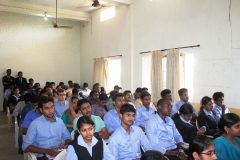MBA Admission 2023-2025
Registration is on for 28th MBA Batch (TANCET Counselling Code 340)
Some Photos from our Gallery
Events ...
MBA Electives
The Marketing specialization allows students to gain an understanding of how marketing relates to all the other functions of a business and how to integrate marketing into everything the business does. The Marketing papers aims to promote a comprehensive understanding of the role of marketing management in consumer, industrial markets and service industries in addition to developing problem-solving and decision-making capabilities in these fields. The purpose of this is to develop a critical and analytical approach to marketing managers tasks within the context of the organization as a whole. Beyond the first-core marketing management class as part of general MBA program, specialization students are required to take integrated marketing communication, Consumer behaviour, Services Marketing, Export management, Rural Marketing,Brand Management, Distribution Managemnt, and Retail Management.
Students interested in the marketing specialization should be curious about why customers buy what they do and how product development, branding, pricing, and other elements of the marketing mix affect consumer choices.After completing the MBA program Marketing students are expected to develop knowledge, understanding, and cognitive, intellectual, practical and transferable marketing skills.
ELECTIVES
- Integrated Marketing Communication (Promotion Management)
- Export Management
- Consumer Behaviours
- Rural Marketing
- Service Marketing
- Brand Management
- Distribution Management
- Retail Management
The field of finance has undergone great changes in the last decade and now represents one of the most dynamic activities within companies of all sizes, as well as within nonprofit and governmental organizations. Executives with a background in finance head about one out of every three corporations today. The finance specalization is designed to provide both a sound theoretical and a conceptual framework for financial managers. Special emphasis is placed on growth and diversification policies, evaluation and management of securities portfolios, investment banking and merger strategies, analysis of foreign exchange rate movements, formulation of plans to reduce foreign exchange risk exposure and case and/or research projects dealing with contemporary financial issues.
Beyond the core curriculum of Financial and management accounting and Financial Management, students opting for financial management will be learning about, Equity Research and Portfolio Management, Financial Services, Derivatives Management, International Financial Management, Cost Management and Insurance Risk Management.
After completing the MBA program Finance students are expected to develop deep understanding, of financial markets and skills required for managing all the financial operations of any organization.
ELECTIVES
- Financial services
- Equity Research and Portfolio Management
- Derivatives Management
- Banking Regulations and Services
- International Financial Management
- Cost Management
- Banking Risk Management
- Insurance and Risk Management
This area of specialization focuses on managing people, the human resource of the organization. Moving beyond common sense and good interpersonal skills, these courses provide students with the knowledge to recruit, select, train, evaluate and compensate employees. Students learn how changes in the workplace, such as governmental regulations, global competition, developing technologies and organizational transformations, influence the performance and productivity of workers.
The core curriculum has Human Resource Management and Business Ethics in addition to it there are other electives like, Staffing in Organizations, Performance management, Training and Development, Managing Interpersonal Effectiveness, Organisational Development and Labour Welfare and Industrial Relations.
After completing the MBA program HR students will gain Technical knowledge and practical skills for dealing with a multicultural workforce ; new ideas on leadership and effective tools for managing human resource.
ELECTIVES
- Staffing in Organization
- Performance Management
- Managing Interpersonal Effectiveness
- Training and Development
- Organisational Development
- Labour welfare and industrial Relations (Legislations)
Until a few years ago, logistics was rarely discussed in large corporations. Today however, effective logistics and supply chain management has gained immense prominence in corporate boardrooms
In today’s complex world, getting products and services to the right places, at the right time is a key determinant of organizational competitiveness. Companies depend heavily on effective and efficient logistics and supply chain processes to make their products and services available to customers.
This unique sector-specific management education programme,focuses on the needs of the Shipping and logistics Industry . The MBA programme is designed to equip students with adequate skills and knowledge in all the areas of general management and with sectoral specialisation in shipping and logistics management
This specialisation covers a wide spectrum of topics including Logistics Management, Export Import Trade and Documentation, Logistics and Supply Chain Management and International Logistics and Shipping Management.
After completing the MBA program Shipping and Logistics students will gain complete knowledge of the Logistics and Shipping Domain. They will also be well versed in the documentation procedures followed by customs department in India. The skills gained will enable them to work in any part of the Shipping and Logistics Industry
ELECTIVES
- Logistics Management
- Export-Import Trade and Documentation
- Logistics and Supply Chain Management
- International Logistics & Shipping Management
The MBA Systems specialization is a specialization for students with professional degree in systems; it combines management skills with the study of information systems analysis and design. The program is designed to develop the student’s ability to formulate and implement management information systems that will promote the achievement of the goals and objectives of the organization. Emphasis is placed upon the theory of information systems analysis ; the modeling of the effective information systems, Software Project Management and E-commerce.
Students who complete this degree are qualified for positions such as Systems Analysts, Supervisors of computer and data processing centers, and Managers of information centers.
Program content balances theory with applications through case studies and projects that emphasize the effectiveness of organizational information systems in achieving the objectives for which the systems are designed. Factors such as the organizational structure and information requirements are studied within the context of ethical, economic, and socio-technical factors that affect the design of systems.This curriculum allows students to explore both technical and managerial issues on these topics under the guidance of our faculty members who are experts in data and information management.
ELECTIVES
- Electronic Commerce
- System Analysis and Design
- Software Project Management
- E- Marketing
The course gives a general management view and introduces the latest concepts and practices on the Production area of the management .This programme is useful for professionals in the manufacturing sector like production and process engineers, quality control engineers, facility engineers, health and safety executives. This programme will provide graduates with skills required for advanced management jobs in the manufacturing industry and other related businesses.
The course material basically covers the production and services areas , requirements, procedures and the organizations operating strategies. It also includes the product design, alternatives, layout, quality control and the project management systems.
The main papers covered are Advanced Production Management, Integrated Materials Management, Total Quality Management and Supply Chain Management. After completing the MBA program Production students will develop the necessary expertise and leadership skills needed to manage a manufacturing plant , recognize the relationships between the manufacturing and other services, and the business functions.
ELECTIVES
- Advanced Production Management
- Integrated Materials Management
- Total Quality Management
- Supply Chain Management
This specalization combines the core ingredients of a high quality, long established MBA programme with selected subjects from visual communication,Public Relations ,Media Management , to understand the management challenges of the media world. The course aims to equip students for a management career in the media or other creative industries.
There is a great need for enhanced specialist skills for effective media managers as today’s media industries change at unprecedented speed and digital technologies facilitate the growth of global markets in content. This course provides graduates with a solid background in business management theory and practice, and also specialised media knowledge and skills to excel and adapt in the exciting field of media management.
Students will study core papers of business management, supplemented by a range of electives like Mass Communication, Advertising Management, Public Relations Principles and Management and Media Management & Ethics. After completing the MBA program Media Management students will gain the knowledge and skills required for working in this new and dynamic field.
ELECTIVES
- Mass communication
- Advertising Management
- Media Laws and Ethics
- Effective Public Relations and Media Strategy
The healthcare industry is continually growing and evolving. MBA with specialization in Healthcare Management is designed to provide professionals with specialized business training in healthcare management, health services, clinical information systems management, global healthcare management, and health services administration.
MBA Healthcare management is getting very popular as there is a wide gap between supply and demand for trained healthcare managers/administrators to work for hospitals, pharmaceutical companies, health insurance and other healthcare providing organizations.
Healthcare Management requires dynamic, young, creative and highly qualified managers and administrators for efficient management of Hospitals and Healthcare organizations by applying modern management techniques.
Health Care majors draw on a rich variety of elective courses like Hospital Operations Management , Public Health system and health insurance, International Health Management and Hospital Architecture and Design which will provide knowledge, vocabulary and advanced skills, concerning all areas of the healthcare delivery system to make administrators proficient, under any situation and to inculcate creativity in them.
After completion of the course, the students will gain theoretical background of those academic disciplines which are related to the field of management in general and those specific to hospitals and Healthcare organizations and acquire necessary knowledge and skills with practical orientation and help formulate strategies for more efficient management of super-specialty hospitals, specially in highly competitive corporate and private sectors.
ELECTIVES
- Hospital Operations Management
- Hospital Architecture Planning and Design
- Public Health System and Health Insurance
- International Health Management
Agriculture business management is a specialization offered by the Institute, which focuses on business aspects of agriculture production and its trade. The specialisation aims to skill professional business leaders and entrepreneurs who pursue MBA at the Institute, in food, agriculture and allied sectors.
The emphasis is on the management and marketing of agricultural products such as crops and livestock. The Agribusiness field entails farming, resource management and conservation of crops. The objectives are to increase the productivity and commercially promote agriculture activity.
The agricultural business field includes resource management, farming, conservation, ranching, and sales. As technology has progressed and markets have become increasingly global, agricultural business has developed to meet and solve high-tech farming needs and problems.
Career scope of Agribusiness Management encompasses farm planning, weather forecasting, research, soil management, seed production, machinery, plant protection, crop nutrient management, harvesting, marketing of produce, storage, supply chain operations, financing, food processing, retailing and much more.
SEMESTER III
- Basics of Agribusiness Management
- Agriculture Marketing System
- Farm Management
- Management of Floriculture and Horticulture
SEMESTER IV
- Agriculture Export Management
- Agriculture Environment Management
- Management of Diaries and Cooperatives
- Poultry and Livestock Management









